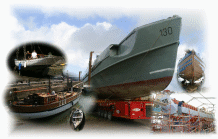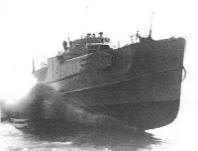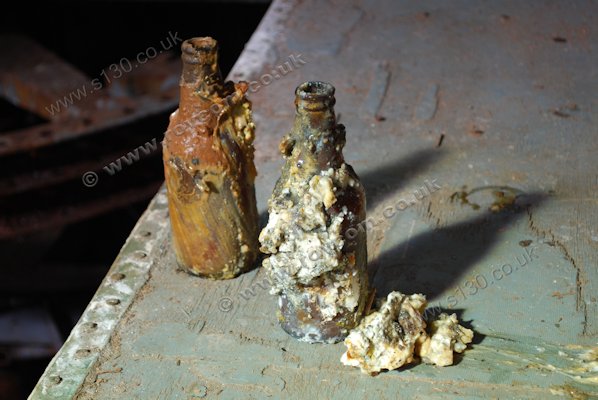


Re-Build ~ New Build ~ Repair
 |
 |
 |
| Shipwrights & Boatbuilders | ||
|
Project
Restorations Re-Build ~ New Build ~ Repair |
| Updated: 27 April 2012 | |
| S130 | |

 |
|
| WW2 German Schnellboot Restoration | |
Dismantling Part 1 |
|
The beer bottles, pictured below, were discovered under the midships fuel tanks, pressed into some strange and yet to be analysed, wax paste, which could be refined whale blubber, that filled the spaces between floor frames in inaccessible areas of the hull. The caps were still in place and beer still in one of the bottles, a little past their best though. Maybe they are a traditional good luck offering that German shipwrights gave to a new boat? Akin to placing a coin under the foot of a mast or a shoe in a chimney. |
 |
|
May 2009 |
|
The rudder quadrant was removed before getting to grips with the keyed rudder stock coupling |
|
which proved reluctant to part |
|
PHOTO GALLERIES: Click on 'Pictures' to view carousel. Click on displayed photo to view full size. Click again to return. |
|
Until a custom puller with a 50 tonne jack, was fabricated. And heat was applied to the problem ............. And |
|
Hey Presto!
|
|
|
|
The trim rudder heads also required the utilisation of heat, puller and jack |
|
June 2009 |
|
|
|
S130 is jacked up to allow relatively comfortable access under the hull to repair the damaged keel |
|
and to enable the rudders to be removed |
|
along with the wing shaft blanking caps, |
|
then to gain access to draw the centre line propeller shaft. |
|
While repairing the keel we investigated some damage to the timbers in way of the garboard strake which show impact from a sharp object, possibly while going astern and swinging to port? |
|
Investigation of the damage to the port side below the waterline in way of the No 2 engine room did not show signs of any foot print on the hull planking from a hard object. The three of the port engine bed support floor members are also buckled in way of the hull damage. This is leading us to surmise that this could be damage resulting from an under water explosion. The signature of the repair work is that of skilled craftsmen who new the way of schnellboot construction, which would further indicate war time damage rather than post war 'dockyard' repairs.
We have since learnt, from British documents, that during the period of the D-Day landings, when S130 was operating out of Cherbourg, a group of British MTBs came across a group of E-boats in line astern. One of the MTBs broke off and cut the line, dropping shallow detonation depth charges just ahead of one of the E-boats. The damage to S130 would fit this scenario, a lucky boat as the weight of the port engine was the only saviour. We are hoping to find Cherbourg harbour log books of the period to confirm, or not, that S130 was in the area on the day and time of this incident.
Another possibility is that, during an air raid on Cherbourg, a bomb detonated under water in close proximity to S130. |